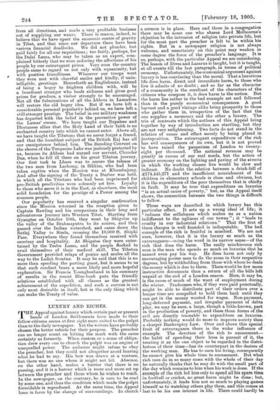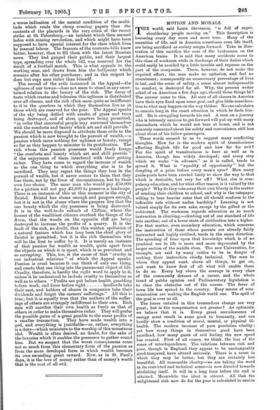a sermon is in place. Here and there in a
congregation there may be some one who shares Lord Melbourne's objection to the intrusion of religion into private life, but for the most part the preacher is felt to be within his rights. But in a newspaper religion is not always welcome, and uncertainty on this point may weaken in some degree the force of the preacher's language. It is so, perhaps, with the particular Appeal we are considering. The lesson of Dives and Lazarus is taught, but it is taught, at all events till the last paragraph, in terms of political economy. Unfortunately, the economical argument against luxury is less convincing than the moral. That a luxurious life does harm, direct and immediate harm, to those who live it admits of no doubt ; and so far as the character of a community is the resultant of the characters of the citizens who compose it, it does harm to the nation. But the harm lies rather in the bad example set and followed than in the purely economical consequences. A good harvest and a good vintage alike bring prosperity to those who gather them in, irrespective of the fact that the one supplies a necessary and the other a luxury. -The trio of contrasts which the authors of this Appeal bring together by way of introduction are startling, but they are not very enlightening. Two facts do not stand in the relation of cause and effect merely by being placed in juxtaposition. The extravagant expenditure of the rich has evil consequences of its own, but it is not proved to have raised the pauperism of London to twenty- eight per thousand. The national revenue may be greatly in excess of our real needs, but the action of greater economy on the lighting and paving of the streets in which the working classes live would be slow and indirect. No doubt the relation between a drink-bill of £174,445,271 and the insufficient nourishment of the children in elementary schools is close and obvious, but it is the expenditure of the poor themselves that is chiefly in fault. It may be true that expenditure on. luxuries "is an actual cause of poverty," but, as the Appeal itself shows, the connection between the two things is difficult to follow.
Three ways are described in which luxury has this particular effect. It sets up a wrong ideal of life; it "induces the selfishness which makes us as a nation indifferent to the ugliness of our towns " ; it "leads to cruelty in our industrial relations." That the first of these charges is well founded is indisputable. The bad example of the rich is fruitful in mischief. We are not sure, however, that it is the luxury so much as the extravagance—using the word in its narrow sense—of the rich that does the harm. The really mischievous rich man is the man who spends so much on luxuries that he cannot even pay his way. He does harm not only by encouraging poorer men to do the same in their respective degrees, but by withholding from those with whom he deals the money which is due to them. There would be few more instructive documents than a return of all the bills left unpaid at the end of a London season. Here, it may be, is the cause of much of the want of employment during the winter. Tradesmen who, if they were paid punctually, might be able to distribute part of their orders over a, . longer time are compelled to hold them back until they can get in the money wanted for wages. Non-payment, long-deferred payment, and irregular payment of debts play, we may be sure, a large, though a little-known, part in the production of poverty, and these three forms of the evil are directly traceable to expenditure on luxuries. Probably nothing would do more to improve society than a sharper Bankruptcy Law. Over and above this special. fruit of extravagance there is the wider influence of example. The devotion of the rich to amusement—. the habit of spending their lives in Pursuit of it, the treating it as the one object to be regarded in the distri- bution of their time—has its counterpart in the desires of the working man. He has to earn his living, consequently he cannot give his whole time to amusement. But what rich men do in so many cases with the whole of their day he naturally thinks that he may do with the small part of the day which remains to him when his work is done. If the example of the rich led him only to spend all his spare time in football or cricket, no great harm might be done ; but, unfortunately, it leads him not so much to playing games himself as to watching others play them, and this comes at last to be his one interest in life. There could hardly be a worse indication of the mental condition of the multi- tude which reads the cheap evening papers than the contents of the placards in the very crisis of the recent strike at St. Petersburg,—an incident which then seemed laden with coming revolution, and. which might have been supposed to have special interest for the class which lives by manual labour. The framers of the contents-bills knew better, however, than to fill them with the latest Russian news. They had gauged their public, and their largest type, spreading over the whole bill, was reserved for the result of a football match. This is what appeals to the working man, and draws from him the halfpenny which remains after his other purchases ; and in this respect he does but copy men richer than himself.
The second of the evils instanced in the Appeal—the ugliness of our towns—does not seem to stand in any ascer- tained relation to the luxury of the rich. The decay of taste which creates and tolerates this ugliness is distributed over all classes, and the rich often seem quite as indifferent to it in the quarters in which they themselves live as in those which are reserved for the poor. The Appeal speaks of the sky being defiled with smoke, of grass and. trees being destroyed, and of slum quarters being permitted, "in order that successful people may surround themselves with the comforts and beauty which art and skill provide." We should be more disposed. to attribute these evils to the passion which is now brought to the pursuit of wealth,—a passion which cares nothing for ugliness or beauty, except so far as they happen to minister to its gratification. The rich whom this passion possesses would freely forego "the comforts and beauty which art and skill provide" if the enjoyment of them interfered. with their getting richer. They have come to regard the increase of wealth as the one thing to which everything else is to be sacrificed. They may regret the things they lose in the pursuit of wealth, but it never occurs to them that they lose them, not by the force of circumstances, but by their own free choice. The same man who would pay £50,000 for a picture will not pay £5,000 to preserve a landscape. There is an instance of this at this moment in the city of Bristol. Bristol has slums enough and paupers enough, but it is not in the slums where the paupers live that the one beauty which the city possesses is being destroyed. It is in the well-to-do suburb of Clifton, where the houses of the wealthiest citizens overlook the Gorge of the Avon, that the woods on the opposite cliff are being destroyed to increase the profits of a quarry. It is the fault of the rich, no doubt, that this wanton spoliation of a natural feature which has long been the chief glory of Bristol is permitted ; but it is the rich themselves who will be the first to suffer by it. It is merely an instance of that passion for wealth as wealth, quite apart from the objects on which it is spent, which is so prevalent and so corrupting. This, too, is the cause of that "cruelty in our industrial relations" of which the Appeal speaks. Passion is cruel because it can think of only one thing, and erects that one thing into the paramount object of life. Cruelty, therefore, is hardly the right word to apply to it, unless it be understood to include cruelty to themselves as well as to others. "Profits are knit before health, gambling before work, and force before right landlords take their rent, and holders of shares in companies take their dividends and forget the earners' sufferings." All this is true; but it is equally true that the authors of the suffer- ings of others are strangely indifferent to their own. Rich men will sacrifice their own health as freely as that of others in order to make themselves richer. They will prefer the possible gains of a great gamble to the surer profits of a smaller transaction. They have made wealth into a god, and everything is justifiable—or, rather, everything is a duty—which ministers to the worship of this monstrous idol. Wealth is often desired, no doubt, for the sake of the luxuries which it enables the possessor to gather round him. But we suspect that the worst consequences come not so much from this elementary form of the passion as from the more developed form in which wealth becomes its own exceeding great reward. Now, as in St. Paul's days, it is the love of money rather than of money's worth that is the root of all evil.







































 Previous page
Previous page